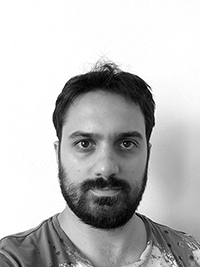Michele Marchi

XXVII Cycle - (A.A. 2012-2013)
Architecture Technology
Home Institution: University of Ferrara
Scholarship (bound research topic)
Curriculum: Architecture (ICAR13)
Research Topic: Home accessibility for Duchenne dystrophy
Tutor DA-UNIFE: Giuseppe Mincolelli
Nationality: Italian
Email: michele.marchi@unife.it
Profile
Biography
Freelance architect and Ph.D in Architectural Technology. He is author of essays and articles, speaker at National and International Conferences, consultant for public and private Bodies and Associations on topics concerning the removal of architectural barriers and the physical, cognitive and social accessibility for public and private buildings. He is engaged as collaborator and consultant in the design of medium-large buildings with particular reference to post-earthquake reconstruction following the 2012 earthquake in Emilia Romagna. As research fellow within the Department of Architecture of Ferrara - TekneHub Laboratory, over the years he is developing skills and projects concerning the relationship between man / environment / interface, with specific focus on vulnerable users . He is a member of the Commission for the Architectural and Landscape Quality of the Municipality of Molinella, member of the Scientific Committee of the Cultural Association OFFICINA and member of the Cerpa (European Center for Research and Promotion of Accessibility).
Research skills
Architecture | Accessibility | Industrial Design | Design for All | Home Accessibility
Scientific activities
ORCID ID:
0000-0001-6984-690X
IRIS UNIFE ID:
rp13541
Doctoral research
DESIGN FOR DUCHENNE.
Guidelines for dwellings’ construction or renovation for muscular dystrophy-affected families.
Duchenne is a rare form of muscular dystrophy that affects 1 boy out of 3500. The first symptoms appear around 2-5 years of age and result in a total muscles paralysis. A conclusive therapy has not been found yet, but there are many trial researches ongoing; thanks to these experiments patients’ quality of life has considerably increased and as such their future prospects. The Italian legislation on accessibility of spaces and services is rather outdated and not entirely relevant for the specific needs of Duchenne Muscular Dystrophy (DMD)–affected children. This research aims to offer a practical guide to renovation or new-construction projects that can be useful for parents of DMD-affected children, designers and experts. The covered aspects include the design of residential buildings’ spatial and functional architectonic elements and the connected design of furniture. Both aspects are conceived having in mind key accessibility requirements by users with limited mobility. The purpose is to improve users’ quality of life, with a specific focus on DMD-affected children and their families. The user-friendly format of these guidelines allow for an inclusive and vast audience. The data analysis relies on the Quality Function Deployment (QFD) framework which was selected given the fact that the tool conceived in Japan at the end of the Sixties is still one of the most sophisticated and widely used. Because of the extremely complex set of specific needs deriving from DMD, the recommendations and suggestions presented throughout this work could be translated and applied also to the dwellings of persons with limited mobility due to other causes or factors.
Keywords
Disability | Accessibility | Inclusion | Architectural Barriers | Duchenne Dystrophy

